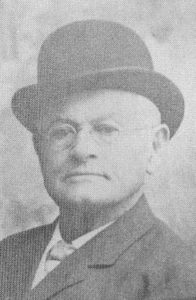
Robert Reed Church Sr.
*Robert Reed Church, Sr., was born on this date in 1839. He was a Black business leader and philanthropist.
Born in Holly Springs, Mississippi, his father was a white steamboat captain, Charles B. Church, and his mother, Emmeline, was an enslaved seamstress who died when Robert was twelve years old. His father employed Robert as a cabin boy and a steward. A few years after a near-fatal steamboat sinking in 1855, young Church was forced to be a cabin steward on a Union steamer during the American Civil War.
Church married three times. His first marriage in 1857 to Margaret Pico was not considered legal, as both Church and his wife were enslaved. His second wife, Louisa Ayres, was of mixed race, born into slavery. They both supported education for their two children, a daughter, Mary Eliza Church, and a son, Thomas Ayres Church. Their daughter Mary Church Terrell was among the first black women to earn a college degree. She became a teacher, principal, and civil rights activist.
In 1865 Robert and Louisa Church settled in Memphis and became entrepreneurs. Luisa opened a string of beauty parlors while Robert acquired a saloon and added to his holdings over the years, eventually owning a restaurant and a downtown hotel. Church and Louisa divorced. He then married Anna Susan Wright. They also had a son, Robert Reed Church Jr.
During the Memphis Race Riot of 1866, a white mob attacked Church’s saloon, shot him, and left him for dead. Church recovered and vowed to remain in Memphis despite the anti-Black violence. He stayed during the Yellow Fever Epidemic of 1878 and bought considerable real estate when property values were depressed.
In 1882, Robert Church entered politics. He campaigned unsuccessfully for a position on the Memphis Board of Public Works to press for more recreational facilities for local Blacks. After his divorce from Louisa, Church married Anna Wright in 1885, and they had Robert, Jr., who eventually followed his father into business and politics. Despite his political failure, Church never gave up that effort and, in 1899, used his own money to purchase a tract of land on Beale Street, where he built an auditorium, landscaped the surrounding grounds, and called the venture Church’s Park and Auditorium, the first major urban recreational center in the nation owned by an African American.
Valued at $100,000 when built, Church’s auditorium seated over 2,000 people and became a renowned cultural, recreational, and civic center for black Memphians. W.C. Handy worked as orchestra leader at the park and auditorium. Speakers and performers at Church’s auditorium included Booker T. Washington, James Weldon Johnson, and the Fisk Jubilee Singers. In 1893 he purchased the first municipal bond issued by the City of Memphis after its bankruptcy in 1879.
In 1902, President Theodore Roosevelt spoke to 10,000 people gathered at the auditorium and surrounding grounds. The President’s presence and speech acknowledged Church's political prominence in Republican Party circles. Two years earlier, in 1900, Church had been a Memphis delegate to the Republican National Convention, which had nominated William McKinley for president and Roosevelt for vice president. In 1906, Church founded the Solvent Savings Bank and Trust Company. During the 1907 Panic, Church avoided a run on his bank by placing bags of money in its windows with signs guaranteed that he had adequate reserves to pay off depositors.
Throughout his years in Memphis, Church gave liberally to local schools, social and civic organizations, and charities. In 1908 he paid off creditors to prevent them from seizing Beale Street Baptist Church. Robert Reed Church, Sr., died in Memphis in 1912 at 73.
Annette E. Church and Roberta Church
The Robert R. Churches of Memphis: A Father and Son Who Achieved in Spite of Race (Memphis: A.E. Church, 1974); Mary C. Terrell, A Colored Woman in a White World (Amherst, NY: Humanity Books, 2006; Lester Lamon, Black Tennesseans, 1900-1930 (Knoxville: University of Tennessee Press, 1977); Robert A. Sigafoos, Cotton Row to Beale Street: A Business History of Memphis (Memphis: Memphis State University Press, 1979)